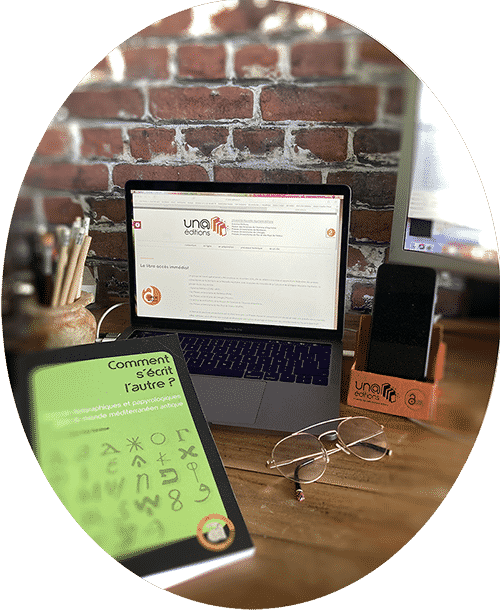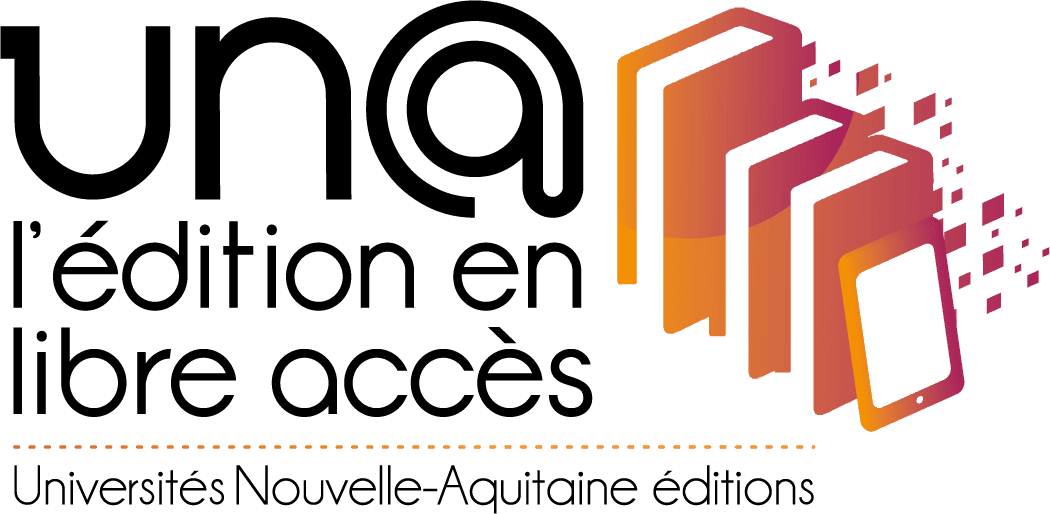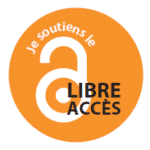Submit a manuscript

For the attention of scientific publishers of collective works or monograph authors
Please send your manuscript proposal to one of the consortium’s university presses, which will carry out its scientific expertise according to its internal rules (expert committee, experts):
– Ausonius éditions : Sophie Krausz, directrice ;
– Publications de la Maison des Sciences de l’Homme d’Aquitaine : Maxime De Lavergne, responsable éditorial ;
– Presses universitaires de Bordeaux : Dominique Picco, directrice ;
– Presses universitaires de Limoges : Jacqueline Hoareau-Dodinau, directrice ;
– Presses universitaires de Pau et des Pays de l’Adour : Victor Pereira, directeur ;
The UN@ éditions team will take charge of the manuscript after its scientific validation. A technical expertise will then be necessary in order to evaluate the feasibility of this new enriched digital project in free access.
≡ ≡ ≡ ≡ ≡ ≡ ≡ ≡ ≡ ≡ ≡ ≡ ≡ ≡ ≡ ≡ ≡ ≡
Our books are all in immediate free access and are produced in two exportable formats:
• a digital html version enhanced with additional content, complementary information or important resources appended to a chapter, a book or an author (bibliography, video, interview, etc.). These references, examples illustrating or bringing a particular light on an element of the text are the result of a joint work of the authors and the platform’s editorial team in order to provide readers with a rich and coherent set of information and links allowing them to have an enlightened reading and to go deeper into the desired subjects. They are destined to evolve over time and in response to readers’ suggestions. With an airy and comfortable architecture, the UN@ edition platform offers easy reading in motion. This new digital space is used to create open and lively research dynamics.
The result of cross-references between researchers, Common Documentation Services and publishers, the site contains elements (metadata, encoding schemes, identifiers) opening up to greater visibility and scientific harvesting.
• a homothetic paper and digital version (pdf) with identical numbering, the full text and its notes.
≡ ≡ ≡ ≡ ≡ ≡ ≡ ≡ ≡ ≡ ≡ ≡ ≡ ≡ ≡ ≡ ≡ ≡
We will need the following information in order to proceed with the scientific and technical expertise of your book file:
– a complete text in .docx and pdf versions containing introductory pages, call for figures, footnotes, bibliography. The file must not exceed 2,000,000 characters;
– a bibliography in Zotero format, per article in the case of collective works;
– an illustration file. These must be in the optimal 300 dpi, tiff version so that we can process them both for the paper version (High definition) and zoomed, as well as for the digital version on this platform (Low definition);
– a letter describing the editorial project, its originality and its interest in being published in open access digital format;
– a list of relevant additional content that you would like to add (videos, podcasts, photo catalogue, internet links, bibliographic orientation…).
Concerning the enrichment of the online version, please contact Stéphanie Vincent to evaluate the feasibility.
≡ ≡ ≡ ≡ ≡ ≡ ≡ ≡ ≡ ≡ ≡ ≡ ≡ ≡ ≡ ≡ ≡ ≡
Once your manuscript has been accepted, please provide :
– a long list of keywords in English and French;
– a hat (short, catchy abstract) of no more than 400 characters;
– an abstract in French and English (you may propose other relevant translations);
– a video presentation of the volume presenting the subject, the context and the interest of the choice of digital;
– and for each author of your book:
-a bibliography with links to university or laboratory, reference books;
-a contact postal address, a telephone number, an email, an IDOrcid or IDHal number;
-a passport photo in 300 dpi, in jpg format;
-additional content (videos, interviews, articles, perspectives…).
≡ ≡ ≡ ≡ ≡ ≡ ≡ ≡ ≡ ≡ ≡ ≡ ≡ ≡ ≡ ≡ ≡ ≡
As a reminder, UN@ éditions follows the recommendations of Open Science and applies the CC-BY-SA license. Remember in priority that when a work is diffused under CC-BY license, any reuse implies that the author is quoted: it is an obligation by the presence of the BY (paternity).
You will find more information on our page dedicated to licences but also on this summary site.

